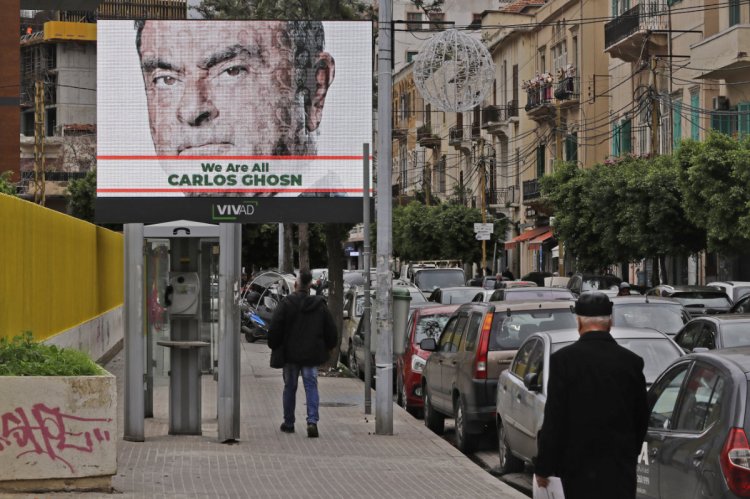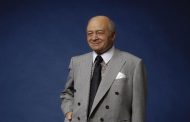Carlos Ghosn, the fugitive auto magnate, said he wanted to be tried in a country he considered more neutral than Japan, he said.
Kyiv. Ukraine. Ukraine Gate – July 19, 2021 – Entrepreneurs
Ghosn, who fled Tokyo 18 months ago, said: “I think the end of it should be a trial, but a trial is taking place in a country that has no interest in what is being prosecuted. The only thing I ask is that the jurisdiction be fair and impartial and not be politically motivated. That’s it.”
In the context of a wide-ranging interview, the former head of the Japanese company Nissan and French Renault spoke about how the French government “abandoned” him after it “surrendered” to Japan. His advice on how Lebanon – where it is currently seeking asylum from the application of international law – can emerge from its dire economic and political crisis. And his views on the Vision 2030 reform strategy in Saudi Arabia.
In a conversation on his “Speak Frankly” series of video interviews with top policymakers and entrepreneurs, he also provided his view on the fierce rivalry between Nissan and Toyota in the Middle East.
It was Ghosn’s most brutal criticism of the Japanese legal system, after his arrest and imprisonment for financial misconduct at Nissan Motor Co., where he was chairman.
Carlos Ghosn arrives for a pre-trial hearing at the Tokyo District Court in Tokyo, June 24, 2019 (Kazuhiro Nogi/AFP file)
“Prosecutors have won 99.4 percent of the time, which is unheard and unseen, quite frankly. Even though I have been living in Japan for 18 years, I have never doubted this kind of outcome,” he said.
“But after going through the system and seeing the kind of intimidation – confession-seeking, pressure, human rights abuse, and so on – I am even amazed that they only get 99.4 percent of the confessions. I wonder how the other 0.6 percent were able to resist when you look at the arsenal of arguments and things they have set against you.”
He said the Japanese justice system has been described by the United Nations as “hostage justice,” adding, “I am ready to go to Japan on the day they change the ‘hostage justice’ system.”
He said he “felt bad” for the people on trial in Japan, including his former lawyer, Greg Kelly. “I was fortunate to be able to get out before the systems closed me down because God knows how many years, but I feel bad for Greg Kelly,” he said.
Japanese prosecutors have charged Ghosn with a variety of financial crimes, including inflating his salary, but he said his pay has been agreed upon by Nissan’s board on several occasions. “I concluded from this that they were happy, especially knowing that the dividend was paid, the company was growing, and the company was profitable,” he said.
Carlos Ghosn, CEO of French car company Renault, arrived on February 17, 2016, at the French National Assembly, before addressing the economic and financial committees during a hearing. (AFP file)
Ghosn – a French national with dual Lebanese and Brazilian citizenship – was also critical of the actions of President Emmanuel Macron’s government, which appeared to want to placate Tokyo over the future of the Nissan-Renault alliance.
“Instead of somehow getting good support, I was abandoned, after two or three weeks of apparent conflict between France and Japan,” he said.
“But then the French gave in, and they said it very clearly – you know we want to maintain the good relationship between Japan and France, we want to maintain the good relationship between Nissan and Renault, and we are confident that Japanese justice will solve this problem with Carlos Ghosn.
Ghosn has been living in Lebanon since December 2019 with his wife Carol and is subject to a “red notice” from Interpol at the request of the Japanese government. Lebanon does not extradite its citizens.
Lebanon asked Japan to transfer the accusations and charges so that they can investigate them and eventually prosecute me in Lebanon. But Japan refused to do so.
Although there was no “chance” to be directly involved in Lebanese politics, including considering any offer to become the next president, Ghosn said he was aware of the “misery that is inflicting on the country due to the financial collapse, and economic stagnation with everyone.” its social consequences.”
“Having upended so many companies, I know from practice that whatever solution you offer when you have to change direction for a company or a country, five percent is the strategy, and 95 percent is the implementation,” he said. “So, in a way, those who are going to save the country are those who are in power and put in power by the Lebanese people, because frankly, the exit methods and strategy are very simple, and it has been (tried) in many countries (and) many companies
He also presented his view on the Vision 2030 reform strategy in Saudi Arabia. “I think that makes a lot of sense — shifting a country from over-reliance on two resources, to different sources of revenue, different sources of income, different types of activity for employment,” he said.
Ghosn warned that the challenge facing Saudi decision-makers lies in implementing that strategy. “The success of this depends on how disciplined it is – implementation, how focused (it will be), the people responsible for delivering that, and how seriously they collect the maximum level of talent to transform the reality of Saudi Arabia.
Saudi Arabia is a very rich country. It makes use of a lot of resources, but I think those in charge of the state know that it won’t last forever. So, in my opinion, they are doing the right thing and I hope it will be successful.”
From his perspective as a global automotive expert, he said that the difference between Nissan’s business and Toyota’s dominant operation in the Kingdom lies in the strength of the distribution network that Toyota has built there in partnership with the Abdul Latif Jameel Group.
“They probably have one of the best distributors in the world in Saudi Arabia, so it would be very difficult to fight if they (Nissan) don’t have people who are approaching that level now,” he said.
He added that he believed that the alliance of Nissan, Renault, and Mitsubishi, which he was developing in the global auto industry, is doomed to collapse.
“Honestly, everything I see today makes me see the Alliance as a zombie – meaning that it appears to be a living matter, but in reality, nothing is happening inside. So, I’m not very optimistic when it comes to the future of this alliance. I hope I’m wrong, but I’ll bet that within the next five years, this whole thing will fall apart completely.”
Ghosn collaborated in making a full documentary by the Saudi media company MBC, entitled “The Last Journey,” describing his dramatic escape from Japan in a large box of musical instruments on a private plane, and analyzing the events that preceded it. , which was released last week.
“I think there was a clear motive from MBC to do that. They were the first ones who came to me and said we would like your cooperation to do something like this, and they were very clear and honest about it.”
Ghosn is planning more propaganda initiatives, as well as legal action against his former employers.
“I want to leave something out in order to help re-establish my reputation, on top of what I will do from a legal standpoint. But I have no intention of returning to the high-flying life I lived before.
Read Also: Carlos Ghosn in the Dark Side of Japan, Life in Lebanon, and His Upcoming Documentary
Source: Ukrgate







